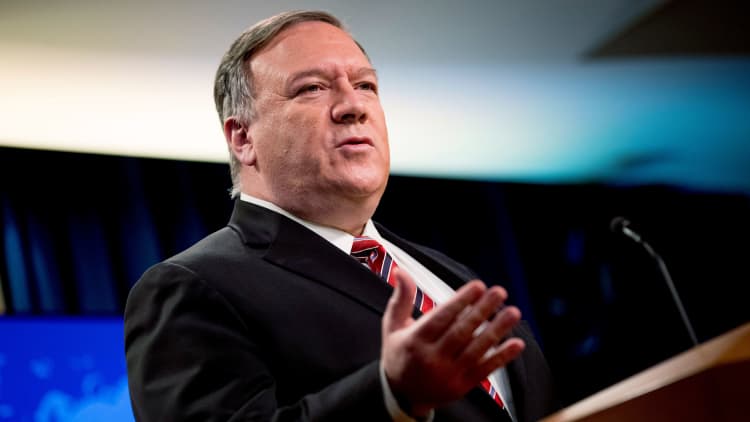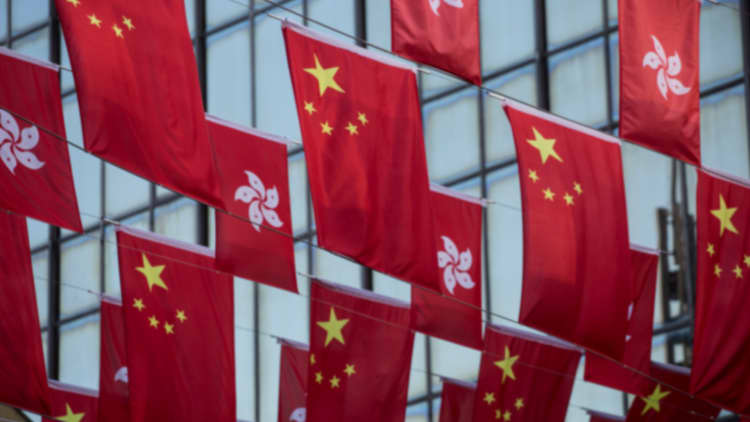Hong Kong has become a "pawn" in the escalating rivalry between the U.S. and China, said Kishore Mahbubani, a prominent Singaporean academic and former diplomat, on Thursday.
Mahbubani was speaking to CNBC before China's parliament approved the proposal to impose a new national security law in Hong Kong.
The U.S. and China have in recent days clashed over Beijing's plan for a new national security law in Hong Kong. Washington criticized Beijing's move for undermining Hong Kong's freedoms and autonomy, while Beijing accused Washington of interfering in its internal affairs.
Hong Kong — a former British colony that returned to Chinese rule in 1997 — is a semi-autonomous Chinese territory with limited self-governing power. Under the "once country, two systems" policy, Hong Kong has a largely separate legal and economic framework from mainland China, and various freedoms including limited election rights.
The U.S. and China are sparring on several fronts: from a trade war to tensions over technology and the origins of the coronavirus pandemic. The Hong Kong dispute is just the latest salvo in an escalating war of words between the world's two largest economies.
Those developments have also sparked concerns about whether the U.S. and China could end up in a military conflict.
"There will be no all-out war between China and the U.S.," Mahbubani, a distinguish fellow at the National University of Singapore's Asia Research Institute, told CNBC's "Squawk Box Asia."
I think other countries have to be very, very careful because there can be proxy wars and that's what superpowers do, they use other people as pawns.Kishore Mahbubaniformer Singapore diplomat
"But at the same time, I think other countries have to be very, very careful because there can be proxy wars and that's what superpowers do, they use other people as pawns," he added. "So Hong Kong ... has now become a pawn in the geopolitical chessboard between United States and China."
Mahbubani spent 33 years as a Singapore diplomat before joining academia in 2004. Among the appointments that he held were the following: Singapore's ambassador to the United Nations and president of the UN Security Council.
'Geopolitical contest' continues
Beijing approved the national security bill for Hong Kong despite Washington's overnight declaration that the city is no longer autonomous from China. That move opens up the door for the U.S. to remove its special treatment of Hong Kong, and could lead to U.S. sanctions on Chinese officials.
That's not the first time the two countries have sparred over Hong Kong, a former British colony that returned to Chinese rule in 1997. Last year, months of widespread pro-democracy protests in the city — a special administrative region of China — led the U.S. to enact two new laws to deter Beijing's influence and interference in Hong Kong.

Those clashes over the city, a major business and financial center, were part of a broader geopolitical contest between the U.S. and China. In the last two years, the conflict led the two countries to slap significant amounts of tariffs on each other — which became one of biggest threats to global economic growth before the coronavirus pandemic.
More recently, tensions between the two countries rose as they disagreed on the origins of the coronavirus which has infected around 5.7 million people globally and killed more than 355,000.
"The geopolitical contest will continue," said Mahbubani, adding that the U.S.-China rivalry is driven by "deep structural issues."
He explained that those issues include the fact that China is "the first non-western" power to emerge on the global stage and that the Asian economic giant is not a democratic country.
"The United States as a democracy finds it hard to accept a non-democracy like China could succeed," he added. "So, there are larger structural forces driving this geopolitical relationship."
— This report has been updated to reflect that since the article's publication, Beijing has approved the national security bill for Hong Kong.
Watch: What is Hong Kong's relationship with China?



